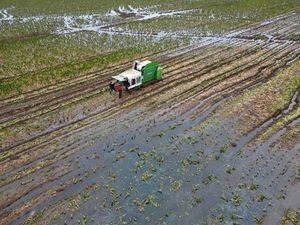Climate change leading to food price volatility, campaigners warn
Food Foundation executive director Anna Taylor said the ‘failures’ of the current food system were being felt by both farmers and consumers.

Climate change is leading to food price volatility and British households are not equipped to cope, campaigners have warned ahead of the Government’s second Farm to Fork summit next week.
Speaking at a media briefing on Thursday ahead of the summit, Food Foundation executive director Anna Taylor said the “failures” of the current food system were being felt by both farmers and consumers.
She said: “Inflation may be out of the news but a basic food basket remains 25% higher than it was two years ago and wages have not kept pace.
“But it’s not just citizens who are struggling. So too are farmers. At both ends of our supply chains, the failures of our current food system are felt.
“The Farm to Fork summit should be setting out a visionary agenda for a food system which prevents global heating and provides affordable nourishing food, and ultimately allows farmers and citizens to thrive.”
The summit, hosted by Prime Minister Rishi Sunak at Downing Street on May 14 to discuss food production and security comes against a backdrop of challenges for farmers, from an “unprecedented” wet winter leading to harvests being hit, to Brexit trading delays and costs and ongoing high input costs such as fertilisers.
According to the Met Office, 1,695.9mm of rain fell from October 2022 to March 2024, the highest amount for any 18-month period in England.
This has led to farmers’ fields being so waterlogged that they cannot be planted, or too wet for tractors to apply fertilisers, leading to poor crop condition.
“It’s a fact that this year, this country is going to be growing, and therefore very likely harvesting, less food.
“I’ve had fields that will remain uncropped for the first time this year. Those crops that have gone in are in very bad condition, there is high levels of disease, fertilising is late or has been missed.”
Separately, David Blacker, an arable farmer at Church Farm, near York, told PA Media that the weather conditions over recent months were “unprecedented”.
He said: “In my farming life I have never known it be so wet for so long.
“Those who didn’t plant before autumn have not had an opportunity at all to plant a crop. Normally you get a chance in autumn or spring. There was a window in September, but by October it had gone.”
He planned to plant 200 hectares in spring with barley or beans but has had to cut this down to five hectares.
“I’ve drawn the line under any profit-making crop. But growing nothing isn’t good for the soil. I have plans to plant a temporary cover crop, just to drag some moisture out of the soil.
“That obviously has a knock-on effect on profit. There’s zero return on that.”
“We’ll feel the financial knock-on effects for 18 months, and that’s providing things return to normal.”
Analysis by the Energy and Climate Intelligence Unit (ECIU), based on AHDB crop area forecasts and Defra yield data, estimates that the production of wheat, barley, oats and oilseed rape may be down by four million tonnes compared to 2023, a reduction of 17.5%.
Compared to the 2015-2023 average, the decline would be over five million tonnes or 21.2%.
Helen Browning, chief executive of the Soil Association, told Thursday’s briefing: “Climate change is threatening food security in this country, of that there is no doubt. And we can’t import our way out of this problem either, given that countries around the world are facing similar problems. So what can we do to help make farming more resilient in the face of climate change?
“Crucially, farmers need support to either maintain practices that increase resilience to climate change, or support to transition to those practices.
“If we want food to be grown here, we need to ensure that the risks are shared through the supply chain; supermarkets and large food manufacturers in particular need to do more to help farmers transition.
“There are no silver bullets and this won’t be easy, but we need to get it right. If we get it wrong, the consequences will be dire for both people and planet.”
“As global temperatures rise, we can expect both floods and droughts to become more extreme. This will lead to waterlogged or parched fields, reducing crop yields, and could increase our reliance on imports. This leaves us more vulnerable to global food price fluctuations and increases the environmental impact of our meals.
“To protect our food security, we must redouble our efforts to reduce greenhouse gas emissions and adapt to the impacts of climate change that are already locked in.
“This means investing in sustainable farming practices, improving flood defences, and supporting farmers as they navigate these challenges.”





